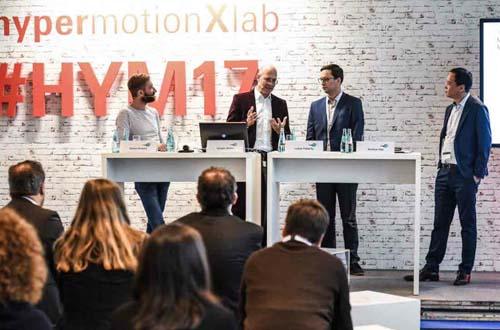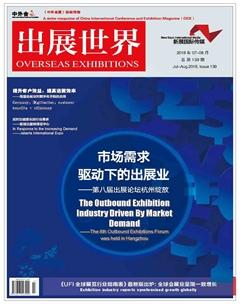Germany:Digitisation: customer benefits+efficiency
By Peter Borstel
Fair companies currently equate digital transformation, above all, with investing in their competitiveness. On the other hand, in-house processes are also improved.
Messe Frankfurt is investing in its digital services. “In total, its almost an eightdigit sum,” says CEO Wolfgang Marzin.“We are pushing ahead vigorously with the introduction of digital applications also in our 30 subsidiaries around the globe.” For Messe Frankfurt benefits for the customer take priority, and not so much the sales generated by digital products. First of all, cash needs to be injected, as Marzins management colleague Uwe Behm tells us: “Investments in digital infrastructure are more or less compulsory, they serve to professionalise the visitor experience.” The company is now working on the optional extras, he explains, pointing out business models that are now being developed. Data utilisation is another conceivable possibility but data protection laws need to be observed.
Messe Frankfurts latest investment was in revamping its Internet presence, which is now being rolled out step by step at all events. The exhibitor and product search engines are being optimised. Full service apps are now available for each of the companys own events and are being used increasingly. Each user receives a personal login for direct access to the customer centre and customised services. The use of artificial intelligence will probably be another exciting novelty in future. Messe Frankfurt launched a digital pilot project with voice assistant Alexa in November – in tune with its universal theme “smart solutions for mobility and logistics” at Hypermotion(www.messefrankfurt.com).
Nuremberg also wants to invest heavily in the next few years. “We plan to spend four to five million euros a year on digitisation and IT,” says Roland Fleck. “At the moment we are laying fibre glass cables in our halls for example,” reports the CEO of NürnbergMesse. With “myLocation”Nuremberg already installed an electronic navigation and information system in 2016. It guides visitors through the halls with huge screens in central spots on the premises and displays in the convention centres. Digital systems are also being used for visitor registration. According to Nuremberg customers have awarded this system top marks. They now no longer need to fill in tedious authorisation documents on site, all this is done in advance - digitally and without an analog registration.
Investments are allegedly being made both to meet the rising expectations of the target groups and to simplify organisational processes. “An innovative service for the customers always requires adapting the processes in the background,” argues CEO Peter Ottmann, who shares the helm of NürnbergMesse with Roland Fleck. He singles out www.standkonfigurator.de as an example: “The installed tool stands out for its high customer benefits and combines user-friendliness with cost transparency.”The underlying internal processes had to be adapted accordingly in order to be able to offer services swiftly and individually. Nuremberg also generates income with digital services. In particular, with our“ask” product database and with the said digital stand configurator,” points out Peter Ottmann (www.nuernbergmesse.de).
Messe Düsseldorf monitors technical developments and changes in customersusage behaviour to adapt its services accordingly. In 2017, the company launched two major projects. “We installed the visitor information system d: vis with integrated‘wayfinding on the entire premises,” says Werner Matthias Dornscheidt. The new information pillars at the entrances and halls can now show the shortest walking distance from the location to the exhibitor,” says the CEO of Messe Düsseldorf. In addition, a marketplace was created using the “Next Generation” e-ordering system. The company uses it to sell all of its own exhibition-related services to exhibitors and to provide access to the offerings of its service partners. “We now have a well-organised shop system that integrates the latest findings on e-shopping behaviour and features the standard elements of a familiar web shop.”
Werner Matthias Dornscheidt refers to customers who shop online every day and are accustomed to convenient shop systems with certain standards. “We wont be able to attract them with an outdated and cumbersome ordering system.” Moreover, all of the companys websites are responsive and adapt to various mobile devices. “This is what customers expect nowadays.” At the same time a new system makes support much easier – because it is the same for all exhibition projects and each customer uses only one account. Plus: “A well-functioning, self-explanatory visitor information system like d: vis makes life easier for our info staff,” says Dornscheidt (www.messeduesseldorf.de).
Leipziger Messe shares this view.“Digitisation lowers process costs,” says CEO Martin Buhl-Wagner. At the same time the fair is already realising new sources of income with the help of the possibilities of e-marketing. “We are still at the start of our journey, but each new experience helps us to make progress.” The company is pushing ahead with digitisation in order to meet its own standards in innovation, customer orientation and service quality. This currently includes an efficient ticket shop, which was developed along the “customer journey”. It features interfaces for public transport, registration and mobile ticket functions, among other things. “We have also invested in the development of our wi-fi network on the entire premises, which our visitors can use free of charge since the liability of wi-fi operators for users copyright infringements(so-called St?rerhaftung) was abolished,”explains Buhl-Wagner.
Leipzig is exploring new avenues in distribution. VR applications support activities at the point of sale. As the examples show, the digitisation activities are both help boost internal efficiency and meet customer expectations. “So we can analyse our processes and draw conclusions for a greater standardisation and efficiency of our processes,” says Martin BuhlWagner. “Of course, we also want to meet the expectations of our target groups in the future.” (www.leipziger-messe.de).
Deutsche Messe in Hannover has launched many a digital innovation in the recent past: “We have invested in our network,”reports Michael Mollath. “And created a modern, efficient IP infrastructure with wi-fi and LAN access at the booth for our exhibitors,” says the Chief Digital Officer.“We have equipped our entire premises with beacon technology.” In addition, a modern e-commerce system was created in Hannover to tie in with exhibitor registration, making it easier to order products and services.
Moreover, a new web presence has been designed for Cebit 2018. Plus: There is a smartphone app offering a map of the fair as a digital companion to guide you through the halls. Deutsche Messe also has a new personalised “trade visitor” badge for registered visitors. “This enables visitors and exhibitors to exchange contact data fast and conveniently at the booth,” says Michael Mollath. “With the AddLeads app the exhibitor can scan the barcode on the trade visitor badge to obtain the visitors data.” Hence, the data no longer needs to be laboriously collected after the show. This also meets the target groups wishes and improves organisation processes (www.messe.de).

